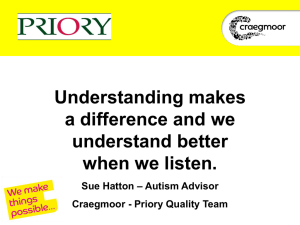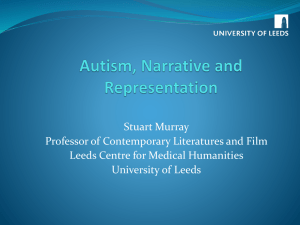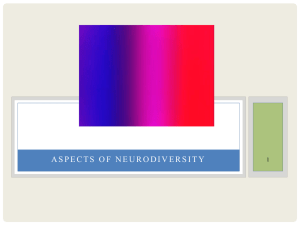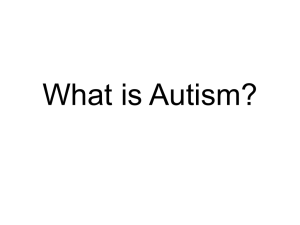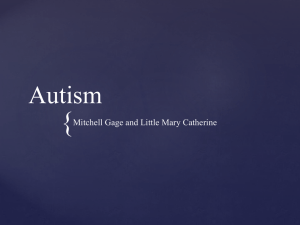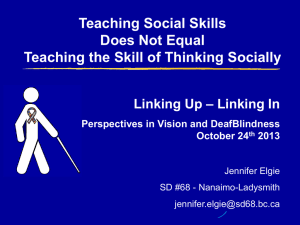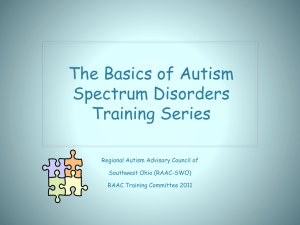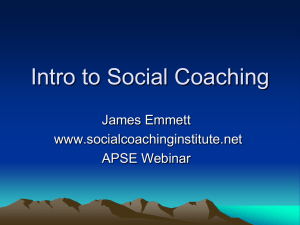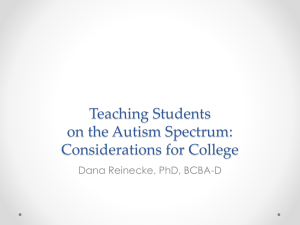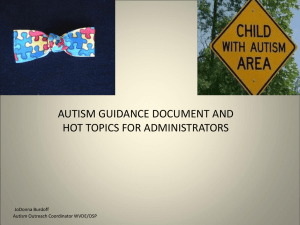Understanding and supporting students on the Autism
advertisement
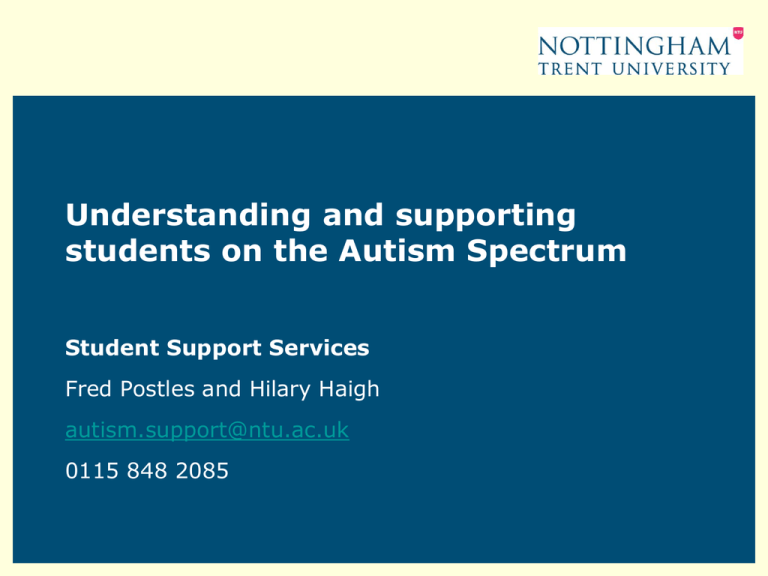
Understanding and supporting students on the Autism Spectrum Student Support Services Fred Postles and Hilary Haigh autism.support@ntu.ac.uk 0115 848 2085 Session outline 1. Introduction to Autism Support at NTU 2. A brief description of Autism Spectrum Conditions, particularly Asperger Syndrome 3. Theory into practice: case studies – Helpful responses – Challenges and constraints 4. Examples of inclusive practice and reasonable adjustments 13 April 2015 2 The Nottingham Trent University Autism Support Team: 13 April 2015 3 The Autism Support Team at NTU Some landmarks in our History •2008 AS team established: Development Officer; Designated Disability Officer; Academic Support Specialist Key priorities: raising awareness; transitional and on course support; forward planning •2009 Mentor scheme pilot •2010 Pre-entry events; Parents Guide; Dedicated AS mentor; on line support •2011 Renamed Autism Support; Fez Society set up 13 April 2015 4 Growth in numbers of HE students with declared autism According to the National Audit Office, 2003 -2008 the number of accepted applicants across the HE sector rose from 139 to 706 At NTU: • 2007/8 - 4 students with autism •2010/11 – 15 students with autism 13 April 2015 5 Breakdown of current students by academic school at NTU • Science and Technology- 14 • Arts and Humanities- 9 • Social Sciences- 5 • Animal rural and environmental sciences- 4 • Law-3 • Art and Design- 3 • Architecture, Design and the Built Environment-3 • Business-0 • Education-0 13 April 2015 6 What is Asperger Syndrome (AS)? Autism spectrum condition is not like a piece of fruit but more like a fruit salad. The combinations in those fruit salads might differ from person to person (Donna Williams). • AS does not mean lack of intelligence • or that you are a genius • University students with AS usually: – have an average or above average IQ – are highly motivated and intensely interested in their course – are exceptionally logical in their thinking 13 April 2015 7 Strengths of people with autism spectrum conditions Enthusiasm Clarity of thinking Originality Independence Spatial Skills Determination Creativity Lateral ‘outside the box‘ thinking Ability to focus Individualism 13 April 2015 Honesty Clear sense of justice Good long term memory Energetic Visual skills Strong rote memory 8 Triad of impairments Social interaction •Getting on with other people socially •Establishing and maintaining friendships •Understanding how to behave in social situations 13 April 2015 9 Triad of impairments Social communication •Speaking to others •Listening to others •Sustaining eye contact •Lack of awareness of body language •Literal understanding of language 13 April 2015 10 Triad of impairments Imagination and flexibility •Coping with change •Making changes to fit in with external criteria •Preference for fixed routines •Strong, narrow, obsessive interests •Tendency to obsessive and repetitive behaviours 13 April 2015 11 Possible associated issues •Motor coordination •Sensory differences such as over or under sensitivity to noise, light, smell, touch •High levels of anxiety and frustration, particularly in relation to change •Depression, often related to social isolation, perceived rejection, low self esteem 13 April 2015 12 Overlap with Splds •According to the ASPECT survey of 237 adults with AS, •23% had dyslexia •15% were dyspraxic Autism Spectrum (inc. Asperger Syndrome) •15% had ADHD Dyspraxia NeuroDiversity Family Attention Deficit Hyperactivity Disorder Dyslexia Dyscalculia 13 April 2015 13 Case studies 1. What are the issues for this student? 2. What would this student find helpful / unhelpful? 3. What can you do to accommodate this student’s needs? 4. What constraints might staff face and how might they be minimised? 5. Are there any issues outside of taught sessions which might affect this student’s ability to engage with their studies? 13 April 2015 14 Case study A Student A has a good memory and appears well-organised. He downloads his weekly timetable and copies it into his diary. He writes down coursework deadlines so that he can plan towards them as he finds it difficult to manage several tasks simultaneously. Student A becomes very anxious when structures or routines change, such as last minute room changes. Student A gets distracted if he doesn’t immediately see how a topic relates to the main course content. He also gets absorbed by one or two topics which really fascinate him. He gets extremely anxious around exam time. In exams, he may wish to have questions read to him, or to read them out loud to himself. After a recent exam he complained that his amanuensis had not written quickly enough. 13 April 2015 15 Case study B Student B is well-organised, punctual and reliable. She can struggle to understand new concepts. However, she is reluctant to approach tutors to ask for advice as she often doesn’t understand it anyway, which can cause frustration. Sometimes her anxiety becomes so acute that she ‘freezes’ and cannot make any progress for days. She always manages to meet coursework deadlines but never feels that her grades reflect the huge effort she puts in. The feedback on her coursework is often confusing as it is not detailed or specific enough, or may involve associations which she is unable to make sense of. She works quite well in small group activities but struggles to make friends. She dislikes travelling on public transport and has trouble going to busy places. She only comes onto campus when she has taught sessions and spends most days in her room. 13 April 2015 16 Case study C Student C processes information very slowly and may spend a whole day thinking about something before it makes sense. He is intelligent but due to his dyslexia he finds research challenging and can struggle to express his thoughts and ideas. Student C is sensitive to light (from reflective surfaces in particular) and sound as he has very acute hearing. He becomes very anxious in new environments and when there is no obvious structure to follow. He finds working in the library particularly stressful and prefers to work in the same area. On a couple of occasions he has become very angry with other students for talking in the quiet zone. He has also been rude to staff when library books have been missing from the shelves. He has accumulated large library fines for not returning short loan books on time, which he thinks is very unfair. 13 April 2015 17 Case study D Student D is of high intelligence and capable of absorbing huge amounts of information. He has perfectionist traits which can cause delays to coursework submission. He experiences anger and frustration when things go wrong, even with issues that seem quite trivial and becomes depressed. He doesn’t like group work. He has a tendency to dominate and can be strikingly honest about others not pulling their weight. This verbal bluntness can lead to social isolation. He is very naïve about personal friendships as he doesn’t easily understand social rules and conventions. He struggles to network with other students so misses out on information which students share between themselves. Student D’s mum is often on the phone asking for more support to be put in place, although so far the student has been reluctant to access services. 13 April 2015 18 Examples of inclusive practice At the start of a programme of study •Named members of academic and support staff to offer ongoing, regular support within set parameters •Clear instructions about who to contact for particular advice •Early access to the NOW system and an induction into how it works so that the student is clear how to access timetable and course information. 13 April 2015 20 Communication •Use clear, concise, unambiguous language, avoiding metaphors, sarcasm and irony •Provide concrete examples •Summarise and write down key points •Check understanding •Make expectations explicit 13 April 2015 21 Lectures and seminars •Try to minimise any sensory distractions •Allow student to sit in preferred position •In the event of inappropriate behaviour, deal with the situation sensitively and calmly explaining clearly and simply in private why the behaviour is not acceptable and what to do in these situations •Investigate non attendance at sessions at any early stage 13 April 2015 22 Organisation • Give clear and prompt information about changes to timetable and routines using consistent methods of communication • Student may need additional clarification of assignment briefs, practical advice on managing complex tasks and flexibility with coursework deadlines • Provide feedback in very plain language explaining areas for improvement • Provide guidance well in advance of exams giving concrete examples of what type of answer is required. • Input additional support at exam time 13 April 2015 23 Group work •May be very challenging for students on the autism spectrum and an alternative form of assessment may be necessary •Assist the student to join a group where the members are supportive of each other •Suggest that the group agrees clear ground rules for working together and allocate roles •Check that the student understands what they have to do 13 April 2015 24 Causes for concern •If a student appears unusually anxious or depressed and is not responding to your support or you are aware that they are not attending sessions, then it is important to try to understand what is underpinning their concerns and intervene at an early stage. 13 April 2015 25 Closing comments “University is a major step for young people with autism owing to the change of routine, location and social environment. Without appropriate support they may not fulfil their potential and complete their degree” (NAO 2009 p30). 13 April 2015 26 Recommendations • Early, proactive input especially around transitions • All staff should have training in understanding autism spectrum conditions, and have access to relevant resources • Support must be individual, tailored to specific requirements and incorporate holistic principles • Maintain regular and ongoing contact with students • Offer social support to combat loneliness without increasing social anxiety • Ask the student e.g. if the intervention is useful • Be consistent in your approach • Set the boundaries of your role 13 April 2015 27 Remember, be: • Realistic • Empathetic • Anticipatory • Logical 13 April 2015 28 Support contacts for students with Autism Spectrum Conditions at NTU Fred Postles •Disability Officer (Autism Support) •Tel: 0115 848 2085 •Email: fred.postles@ntu.ac.uk Hilary Haigh •Academic Support Specialist •Tel: 0115 848 2399 •Email: hilary.haigh@ntu.ac.uk 13 April 2015 29 References Beardon, L. & Edmonds, G. (2007). The Aspect report. A national report on the needs of adults with Asperger Syndrome. www.shu.ac.uk/theautismcentre Madriaga, M. (2008). Experiences of students with AS making their transition into university [presentation]. Part of the HEA Research Seminar Series: Disability Equality Partnership Inclusive policy and practice: Rhetoric or Reality? Held on 7 Feb 2008. Martin, N. (2008). REAL services to assist students who have Asperger Syndrome. [online]. Sheffield Hallam University. www.shu.ac.uk/education/theautismcentre/papers.html National Audit Office, (2009). Supporting people with autism through adulthood. [online]. www.nao.org.uk/publications/0809/autism.aspx 13 April 2015 30

